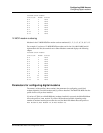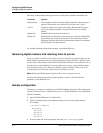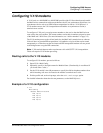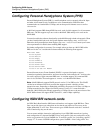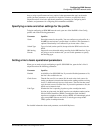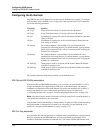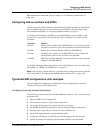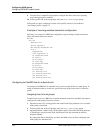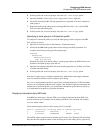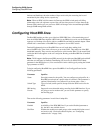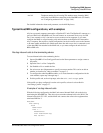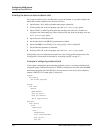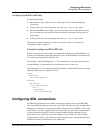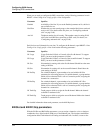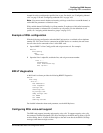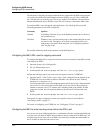
Configuring WAN Access
Configuring ISDN BRI network cards
MAX 6000/3000 Network Configuration Guide 3-39
4 Exit the profile and, at the exit prompt, select the exit and accept option.
5 Open the Net/BRI > Line Config > Line Config profile > Line 1 subprofile.
6 Set the B1 Trnk Grp and B2 Trnk Grp parameters to assign both of the line’s channels to
trunk group N.
7 Repeat this trunk-group setting for the remaining BRI lines (lines 2–8), so that all BRI
lines are in the same trunk group.
8 Exit the profile and, at the exit prompt, select the exit and accept option.
Specifying a trunk group in a Connection profile
To configure a Connection profile to specify the trunk group you have assigned to the BRI
lines, proceed as follows:
1 Open the Connection profile (in the Ethernet > Connections menu).
2 Include the Net/BRI trunk-group number in the setting for the Dial # parameter. For
example, the following setting specifies trunk group 6:
Ethernet
Connections
Connections profile
Dial #=6-555-1212
When the first digit of the Dial # setting is a trunk-group number, the MAX unit uses the
channels in that trunk group to place the call.
3 Open the Telco Options subprofile and set the AnsOrig parameter to Call Only, or to Both,
to enable outbound dialing.
4 Exit the profile and, at the exit prompt, select the exit and accept option.
Note there are other ways to configure outbound calls. Other features that support outbound
calls are: immediate modem services and port-to-port dialing.
For a way to use Destination profiles to specify lines as backup channels if all WAN channels
are busy, see “Configuring outbound calls” on page 3-69. Instead of explicitly entering the dial
number in the Connection profile, you can reference a Destination profile that can specify up
to six different dial-out paths to a particular destination.
Displaying information about BRI calls
If the BRI line switch type is German 1TR6, you can display information about ISDN calls
from the terminal-server command line by entering the Show Calls command. For example:
ascend% show calls
The command displays statistics about current calls. For example:
Call ID Called Party ID Calling Party ID InOctets OutOctets
3 5104563434 4191234567 0 0
4 4197654321 5108888888 888888 99999
The Call ID column contains an index number specific to the call. Called Party ID and Calling
Party ID show the telephone number of the answering device and calling device, respectively.



